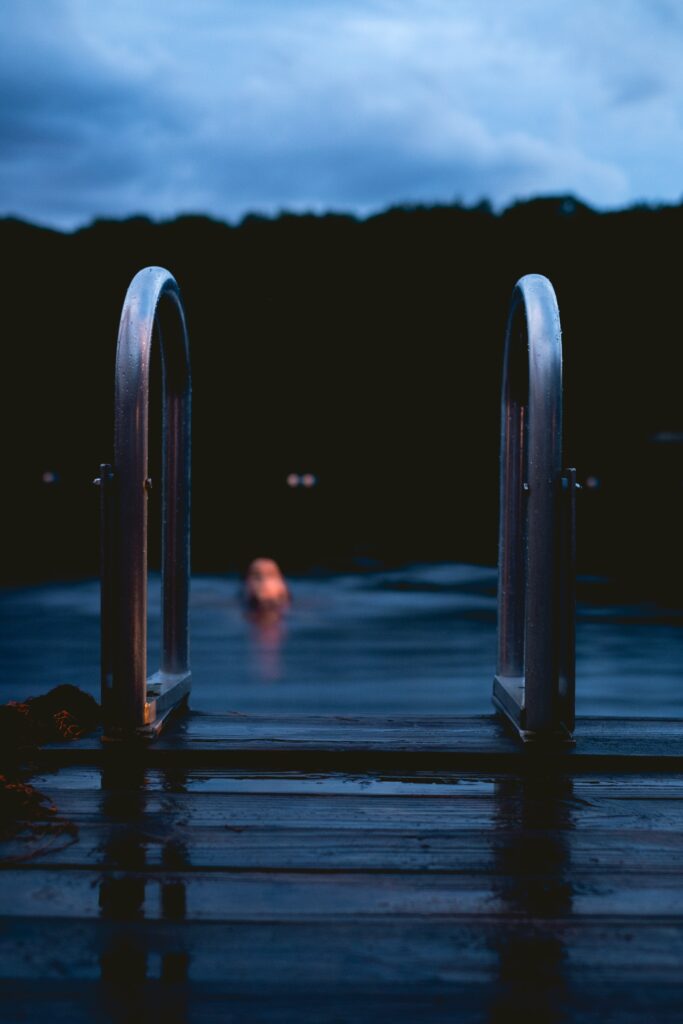Summer Dresses
“I was much farther out than you thought
And not waving but drowning.”
—Stevie Smith
One summer I watched my next-door neighbor string wash on the line. Clothespins looked awkward in her fingers. She pinched at collars; the shoulders kept slipping like she was wrestling with a ghost. The wet cloth tugged the line down like one demand after another. I heard voices rise from open windows. Her husband yelled over the fence at my dog when he barked, shut up shut up SHUT UP.
When my husband screamed at me like that my dog jumped through our storm door to get to me, shattering glass. So much yelling, inside or out, shards of words on the floor, in his fur, in the air. I moved into the guest room after waking to unwelcome hands and breath. I suffocated long after I pulled away. I drank too much red wine which stained my lips, occasionally my shirt, the pages of my books. I would leave soon.
From the garden, I could see over the fence to her yard. The lawn looked scalped, dry, mown too closely. No rain for months. My dog came to me from behind the shed, carrying his tennis ball, tongue lolling. When he reached me, I knew no ball was in his mouth, his cheek so swollen it bulged, warm to the touch. Snake bite. I drove to the vet, where he got fluids, an antibiotic shot. Snakes were out, they said, looking for water.
Every day my neighbor hung the clothes, and I watched from a distance. I remember how everything seemed bodiless and strung up, unoccupied, my mind a blank. One late afternoon, a storm came quickly, finally rain. I watched her trying to retrieve the shirts blowing wildly in the breeze, sleeves slapping her face. At dusk, while picking tomatoes, I saw her through her kitchen window, mostly just her face and arms as she washed dishes, the rest of her out of the window’s frame, a humid mist between us. A white plate rose and fell into view, her hands lost one at a time in the water as she rinsed. She stopped and looked out once, maybe in my direction, maybe broken.
We never spoke, even when I moved out, my clothes haphazard on hangers, my milk crates of books thrown hurriedly into my car. Did she see me go, wonder why, already know, wish she could, too? I took my dog. I forgot the earrings my now-dead father gave me, tiny emeralds. I still dream about whole days billowing up against the sky, sleeveless summer dresses empty and waving. Or did we tie enough sheets together to make a giant white balloon? Take the basket I used to gather tomatoes and string it up with shirtsleeves? Hot air parachute over the fields squared below like quilts, the lowing sounds of cattle ooh-ing and ah-ing our ascent? Look up, we’d cry to everyone below. Look up. LOOK UP.
Bodies of Water
At dock’s edge, where the lake lengthened out its quiet dark, buoys rocked in the lap-lap-lap of invisible currents, and the unseen made us tremble, the hair rising on our arms, we pulled at hems and stubborn sleeves in haste. Racing the storm, we slipped shivering into water as blue gray as slate, shallower than we thought—where
the bottom shifted below us. I cut my foot on glass half buried in the silt, tilted back to float and look, only my toes surfacing, felt the guilt only a 13-year-old good girl would feel for sneaking out at camp. The cut was white at its edges. My foot looked strange, wrinkled, as detached as someone else’s. Blood bloomed like a time-lapsed flower. I dove down, found the fragment of glass that turned emerald-dark in the cloud break under a sliver of moon—
such opaque, curved offerings. When I swam out to you, the skin around my cut rippled like a fragile gill reminding me to breathe. We couldn’t stay long, our legs barely touching under water. Someone was calling time to get back. We kicked to the dock. You said into my ear, imagine: your cut will scar like a sliver of moon. Then under my feet, wet boards steamed. Another girl slipped and laughed. The wind picked up a waft of pine, the storm closer, closing in. Suddenly scared of getting caught, we were only legs and arms, the slipping touch of fingers to back, the brush of someone’s hair, whispers
and fear. So hard to pull at clothes wet from splashes, denim clinging to skin. After all that careless touching, we were suddenly modest and shy. The pines also whispered as we made our way back, the paths of straw so soft, my foot didn’t hurt in those steps away from skinny-dipping secrets and touches, from our selves then, such tenderness like ghosts walking beside us. On the last night we returned to the lake, made cardboard boats, pressed candles on with melted wax, burned our fingers as we lit the wicks and set them all afloat—small flames aloft on nothing more than layered paper rocked by the mouths
of minnows. Unsteady light flickered around our faces each time a match was struck. Mist rose off the lake, and we were rising, falling, too, the dock creaking. I know we tasted June as a coin on the tongue, as ferric as bronze or blood. Fugitive communion in memory of bodies we didn’t think we’d lose. Selves who’d never be as intimate with each other again. Invisible currents carrying everything where the moon whispered mouths away. A kiss. A scar.
—
Elinor Ann Walker’s recent work is featured in Whale Road Review, Nimrod International Journal, Juniper, The Orchards Poetry Journal, The Rappahannock Review, and Plant-Human Quarterly, among other journals and anthologies. A Best Microfiction and Best of the Net nominee, she prefers to write outside. Find her online at https://elinorannwalker.com
Photography by: Nick Dunlap
